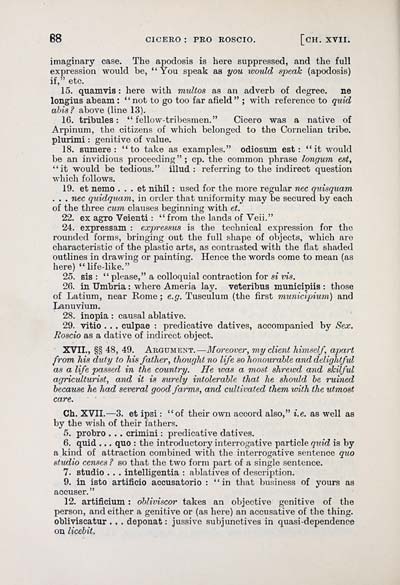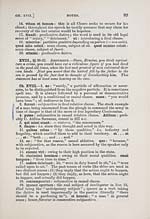Download files
Complete book:
Individual page:
Thumbnail gallery: Grid view | List view

68 CICERO : PRO ROSCIO. [CH. XVII,
imaginary case. The apodosis is here suppressed, and the fu!l
expression would be, " You speak as you would speak (apodosis)
if," etc.
15. quamvis : here with muUos as an adverb of degree. ne
longius abeam : ' ' not to go too far afield " ; with reference to quid
abis? above (line 13).
16. tribules : " fellow-tribesmen." Cicero was a native of
Arpinum, the citizens of which belonged to the Cornelian tribe.
plurimi : genitive of value.
18. sumere : " to take as examples." odiosum est : " it would
be an invidious proceeding"; cp. the common phrase longum est,
"it would be tedious." illud : referring to the indirect question
which follows.
19. et nemo . . . et nihil : used for the more regular nec quisquam
. . . nec quidquam, in order that uniformity may be secured by each
of the three cum elauses beginning with et.
22. ex agro Veienti : " from the lands of Veii."
24. expressam : expressiis is the technical expression for the
rounded forms, bringing out the fuU shape of objects, which aro
characteristic of the plastic arts, as contrasted with the flat shaded
outlines in drawing or painting. Hence the words come to mean (as
here) "life-like."
25. sis : " please," a colloquial contraction for si vis.
26. in Umbria : where Ameria lay. veteribus municipiis : those
of Latium, near Rome ; e.g. Tusculum (the first municipium) and
Lanuvium.
28. inopia : causal ablative.
29. vitio . . , culpae : predicative datives, accompanied by Sex.
Roscio as a dative of indirect object.
XVIL, §§ 48, 49. Argumiont. — Moreover, myclient himself, apart
from his duty to hisfather, thotight no life so honourable and delightful
as a life passed in the country. He was a most shrewd and skilful
agriculturist, and it is surely intolerahle that he should be ruined
because he had several good farms, and cuUivated them with the utmost
care.
Ch. XVIL — 3. et ipsi : "of their own accord also," i.e. as well as
by the wish of their fathers.
5. probro , , , crimini : predicative datives.
6. quid , , . quo : the introductory interrogative particle quid is by
a kind of attraction combined with the interrogative sentence quo
studio censes ? so that the two form part of a single sentence.
7. studio . . , intelligentia : ablatives of description.
9. in isto artificio accusatorio : "in that business of yours as
accuser."
12. artificium : ohliviscor takes an objeetive genitive of the
person, andeither a genitive or (as here) an aecusative of the thing.
obliviscatur , . . deponat : jussive subjunctjves in quasi-dependence
on licebit.
imaginary case. The apodosis is here suppressed, and the fu!l
expression would be, " You speak as you would speak (apodosis)
if," etc.
15. quamvis : here with muUos as an adverb of degree. ne
longius abeam : ' ' not to go too far afield " ; with reference to quid
abis? above (line 13).
16. tribules : " fellow-tribesmen." Cicero was a native of
Arpinum, the citizens of which belonged to the Cornelian tribe.
plurimi : genitive of value.
18. sumere : " to take as examples." odiosum est : " it would
be an invidious proceeding"; cp. the common phrase longum est,
"it would be tedious." illud : referring to the indirect question
which follows.
19. et nemo . . . et nihil : used for the more regular nec quisquam
. . . nec quidquam, in order that uniformity may be secured by each
of the three cum elauses beginning with et.
22. ex agro Veienti : " from the lands of Veii."
24. expressam : expressiis is the technical expression for the
rounded forms, bringing out the fuU shape of objects, which aro
characteristic of the plastic arts, as contrasted with the flat shaded
outlines in drawing or painting. Hence the words come to mean (as
here) "life-like."
25. sis : " please," a colloquial contraction for si vis.
26. in Umbria : where Ameria lay. veteribus municipiis : those
of Latium, near Rome ; e.g. Tusculum (the first municipium) and
Lanuvium.
28. inopia : causal ablative.
29. vitio . . , culpae : predicative datives, accompanied by Sex.
Roscio as a dative of indirect object.
XVIL, §§ 48, 49. Argumiont. — Moreover, myclient himself, apart
from his duty to hisfather, thotight no life so honourable and delightful
as a life passed in the country. He was a most shrewd and skilful
agriculturist, and it is surely intolerahle that he should be ruined
because he had several good farms, and cuUivated them with the utmost
care.
Ch. XVIL — 3. et ipsi : "of their own accord also," i.e. as well as
by the wish of their fathers.
5. probro , , , crimini : predicative datives.
6. quid , , . quo : the introductory interrogative particle quid is by
a kind of attraction combined with the interrogative sentence quo
studio censes ? so that the two form part of a single sentence.
7. studio . . , intelligentia : ablatives of description.
9. in isto artificio accusatorio : "in that business of yours as
accuser."
12. artificium : ohliviscor takes an objeetive genitive of the
person, andeither a genitive or (as here) an aecusative of the thing.
obliviscatur , . . deponat : jussive subjunctjves in quasi-dependence
on licebit.
Set display mode to: Large image | Transcription
Images and transcriptions on this page, including medium image downloads, may be used under the Creative Commons Attribution 4.0 International Licence unless otherwise stated. ![]()
| Early Gaelic Book Collections > Matheson Collection > Pro S. Roscio Amerino > (96) |
|---|
| Permanent URL | https://digital.nls.uk/76503388 |
|---|
| Description | Items from a collection of 170 volumes relating to Gaelic matters. Mainly philological works in the Celtic and some non-Celtic languages. Some books extensively annotated by Angus Matheson, the first Professor of Celtic at Glasgow University. |
|---|
| Description | Selected items from five 'Special and Named Printed Collections'. Includes books in Gaelic and other Celtic languages, works about the Gaels, their languages, literature, culture and history. |
|---|

